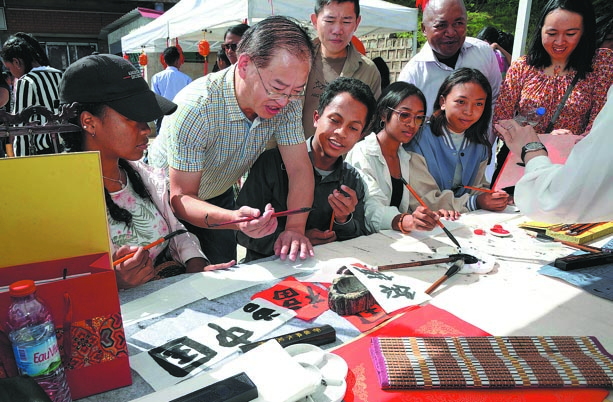Education key to realize shared Sino-African goals
By Wang Yan | China Daily | Updated: 2023-12-28 07:56

Africa is a land of immense beauty and promise, and China is a rising nation with huge potential in different fields. But despite being different in many ways, culturally, politically and socially, the two sides share the same aspirations for development and the well-being and prosperity of their people.
Education, the linchpin of sustainable development, plays a key role in Sino-African cooperation. Education facilitates exchanges of ideas, spreads knowledge and fosters skills. It serves as a driver for equitable, quality and inclusive education, and a catalyst for achieving sustainable development goals. And deeper cooperation between Africa and China in education will help advance economic growth, enhance social cohesion and strengthen nation-building.
There have been a variety of education exchanges and cooperation activities between Africa and China since the 1950s. Many students from Africa have come to China for higher studies thanks to the scholarships offered by the Chinese government and higher education institutions, and more have learned (and are learning) the Chinese language and history at Confucius Institutes, in order to brighten their career prospects in China.
On the other hand, the Luban Workshop, since its establishment as the first of its kind platform in Djibouti in 2019, has been offering a range of skill development programs, combining academic education and vocational training, to promote youth employment and improve the quality of life of the African people.
Recent years have seen increasing Sino-African institutionalized cooperation arrangements, including inter-university networks. For instance, the China-Africa Universities 20+20 Cooperation Plan in 2010, which links 20 African universities with 20 Chinese universities, has been scaled up to "China-Africa 100 Universities Cooperation Program".
Moreover, ways to deepen Africa-China education cooperation is being discussed even at high-level meetings such as the Forum on China-Africa Cooperation's ministerial conference and multilateral platforms such as BRICS and the Belt and Road Forum for International Cooperation.
In August 2023, the Plan for China-Africa Cooperation on Talent Development was launched at the BRICS Summit in Johannesburg, South Africa. Asserting that talent is the primary resource underpinning economic and social development, the plan aims to train 500 principals and high-caliber teachers of vocational colleges every year, and 10,000 technical personnel with both Chinese language and vocational skills for Africa, as well as invite 20,000 government officials and technicians from African countries to participate in workshops and seminars.
As a result, a Sino-African education cooperation architecture has taken shape. Yet it will take time to have an impact on people in such a large and diverse continent as Africa and country as China. To be sure, the challenges Africa and China face in developing education are different. While it is more about quality education in China, it is about universalizing education at the primary and secondary level in Africa, partly due to a shortage of teachers.
Nonetheless, there is more common ground between the two sides: both aim to provide inclusive, equitable and quality education, and shift from the examination-oriented education to competency-based education. And both recognize technology as a catalyst for educational development for digital empowerment.
What binds Africa and China together are developmental needs and their shared future. China's education policy and approach to education development over the past decades could inspire African countries to reform their policies, and synergize their measures with China and other relevant stakeholders to produce better and more deliverables.
The potential for boosting Sino-African cooperation is huge. But for that, it is necessary to scale up exchanges of students and academicians through not only government scholarships but also other types of scholarships including those offered by local administrations, higher education institutions, and industries and businesses.
There is also a need for the two sides to use digital technologies to expand virtual mobility as well as exchange and cooperation in science and technology in universities and beyond, scale up exchanges and deepen cooperation in skill development, particularly through government-industry-academia cooperation to boost the employability of youths and fuel economic development.
This will not only enhance South-South learning and capacity building, but also bring about positive changes by creating more and better education and employment opportunities for youths in both China and Africa.
The author is an associate research fellow at the Academy of Regional and Global Governance, Beijing Foreign Studies University. The views don't necessarily represent those of China Daily.
If you have a specific expertise, or would like to share your thought about our stories, then send us your writings at opinion@chinadaily.com.cn or comment@chinadaily.com.cn.
























